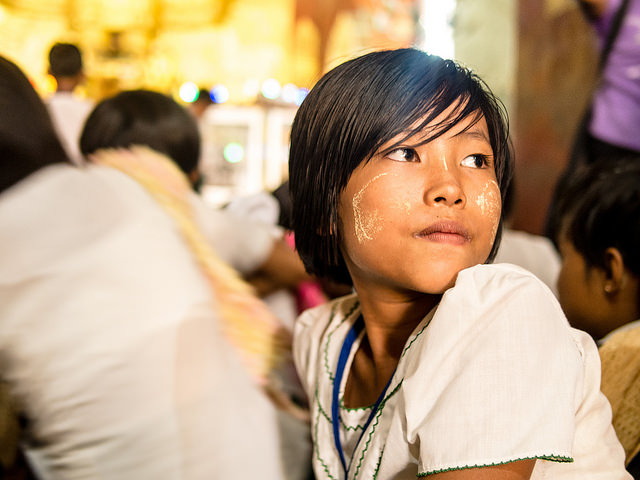
You might also like:
The southeast Asian country, formally known as Burma, is now officially open to tourists and ready to welcome the world. However, as visitors, we must keep in mind that the years the country spent being ruled by a very tough military regime put it in a kind of isolated bubble. These days, Myanmar’s newbie status as a tourist destination can make it vulnerable to exploitation.
1. Where you visit, eat and buy services has the power to help locals, or hurt them.
An estimated 40% of the revenue generated visitors by Myanmar leaves the country, something known as “tourism leakage.” For the maximum benefit of the local people, practice responsible tourism and ensure your dollars stay put in Myanmar. Instead of a large hotel-based spa, use a local beauty parlor to have a pedicure (about $5). Instead of a five-star, foreign-owned hotel restaurant, buy from the street vendors who sell everything from samosas to freshly fried potato chips and used books. Buying from individuals instead of corporations helps to keep money in the country.
2. So does your transport decisions…
Take cabs with the Golden Harp Taxi Service. This Yangon-based company was founded by three former political prisoners that spent more than 30 years in jail collectively. Getting a job as a dissident can be tough, so these guys launched their own business where their background wasn’t as issue. (Phone: 09 73040615)
And anytime you take short urban trips go via rickshaw instead of government transportation so you’re getting money in the hands of the people who need it most.
3. …and your antique shopping.
Myanmar is among the poorest countries on the planet, according to World Bank, so desperate people have been known to pillage artifacts from temples and other religious sites. These antiquities end up in the hands of unscrupulous sellers looking to make a quick buck on the black market. In the markets of big tourist spots like Mandalay, you might be asked by vendors if you want to buy antique Buddha statues and such. Just say no and move on. Opt to buy handmade crafts instead at the factories where they are made. Your dollars help companies that employ Burmese people.
4. Even when there’s no security or regulations at historical sites, you should pretend there is.
With tourism infrastructure still in its infancy, many temples and pagodas, (especially in Bagan where there are almost three thousand such structures) don’t charge admission or have anyone staffing the site. You’re free to explore as you like, but be nice and don’t climb on these ancient, brittle monuments or take any rocks you happen to find lying around them.
5. Skip the chitchat about politics with the Burmese, unless they bring it up.
The subject of Myanmar’s turbulent past can be a sensitive topic. The country has gone through some horrific experiences because of their repressive, violent military government. Many families lost members because of imprisonment or death. Some Burmese will be open to discussions about the past; some will not. It’s best not to initiate them.
6. Some of the best places to send your donations are monasteries and nunneries.
For many Burmese kids, their only hope of getting an education and bettering their lot in life comes from these monastic institutions — more than 1,500 country-wide, according to one UNESCO report — funded through a mix of private and government money. They feed, educate and clothe them. Feel free to donate money or a bag of rice to support their role in the community they serve.
7. Just because it’s a tourist attraction doesn’t mean it’s not also a religious area that deserves respect.
Myanmar is largely Buddhist and chances are you’ll visit your fair share of temples while visiting tourist hubs like Yangon, Bagan and Mandalay. That means taking off your shoes and socks before entering. Dress modestly. No sleeveless tops. Knees and shoulders must be covered.
Also, if you see a monk or nun, it’s not cool to touch their robes. And you’d like to offer a donation, don’t hand money to them directly. Traditional practices dictate they are not allowed to touch money, depending on their age and status.
Source: matadornetwork.com
